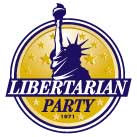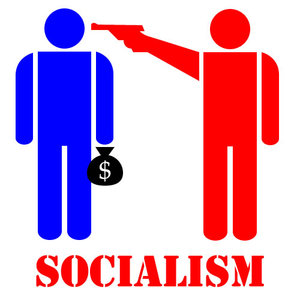 The Libertarian Party is the party of principle. To publicly affirm what we believe -- and to ensure that our party never strays from our principles -- we ask our members to proudly sign this statement: The Libertarian Party is the party of principle. To publicly affirm what we believe -- and to ensure that our party never strays from our principles -- we ask our members to proudly sign this statement:
I do not believe in or advocate
the initiation of force
as a means of achieving political or social goals.
This is the principle that undergirds the Free Market System, and made America the most prosperous and admired nation on earth. The two-party monopoly (Democrat/Republican) believes it is acceptable to initiate force against others: to tax, to conscript, and even to kill. Socialism always involves the initiation of force against the innocent. The consistent Libertarian will never approve the initiation of force or violence.
|
In 1972, Libertarian Party Vice Presidential candidate Tonie Nathan became the first woman in U.S. history to receive an electoral vote.
|
|
|
The Libertarian Party is America's third largest party. Since its founding in 1971, more Libertarian Party votes have been cast than the Constitution Party, Green Party, and Reform Party combined. More Libertarian candidates have sought political office than the Constitution Party, Green Party, and Reform Party combined. No third party in U.S. history has ever received more votes for U.S. Congressional candidates than the Libertarian Party earned in the election of 2000.
 The Libertarian Party hopes to be like the Socialist Party in the early 20th century -- in the opposite direction. Socialist Party candidates did not win many elections, but the Socialist Party influenced many politicians in the other parties. Norman Thomas, who was the Socialist Party candidate for President in every election from 1928 through 1948, was asked if he would run again in 1952. He said no, adding wryly that Democrats and Republicans had already adopted his platform. Thomas acknowledged that Americans had rejected socialism emphatically when it was offered forthrightly as "socialism," but had accepted it
when presented as "welfare state" measures by Democrats and Republicans. The Libertarian Party hopes to be like the Socialist Party in the early 20th century -- in the opposite direction. Socialist Party candidates did not win many elections, but the Socialist Party influenced many politicians in the other parties. Norman Thomas, who was the Socialist Party candidate for President in every election from 1928 through 1948, was asked if he would run again in 1952. He said no, adding wryly that Democrats and Republicans had already adopted his platform. Thomas acknowledged that Americans had rejected socialism emphatically when it was offered forthrightly as "socialism," but had accepted it
when presented as "welfare state" measures by Democrats and Republicans.
Libertarians hope to make socialist America a nation of Liberty and Free Markets once again. Your vote for a libertarian candidate will help force Democrat and Republican candidates to reject socialism and promote liberty. Your vote for a "winner" who promotes socialism once in office is a wasted vote.
 Begin to learn more about the Libertarian Party from our Introduction. Begin to learn more about the Libertarian Party from our Introduction.
- Statement of Principles.
- The basic political philosophy of the Libertarian Party is stated in its Statement of Principles.
- Platform
- The elaboration of these principles into positions on a wide range of specific issues is contained in our comprehensive Platform.
The LP Program is a statement of the Party's legislative recommendations on several issues of current concern.
In presidential election years, the convention adopts the National Campaign Platform of its presidential candidate.
Other official LP positions are stated in the form of resolutions adopted by the LNC (Libertarian National Committee).
The views of LP spokespersons are expressed in our press releases. The Press Release Archive is useful in locating specific resolutions and positions.
- Popular Understandings of Libertarianism
- The most popular understanding is "Liberty and Personal Responsibility"
-
Libertarians say they're the third largest political party | PolitiFact Florida
Related public policy sites:
• Cato Institute
• Mises Institute
• Heartland Institute
• Reason Foundation
• The Independent Institute
• Mackinac Center for Public Policy
• The Acton Institute for the Study of Religion and Liberty
Harry Browne articles:
- Believing in People, December 16, 1999
- Bringing Back Liberty, June 12, 2001
- Campaign platform, presidential, 2000
- Defending our 'Freedoms', May 23, 2002
Do You Have Too Much Freedom?, February 5, 2001
- Florida: Now We Know How Government Operates, November 21, 2000
Freedom Is Responsibility, July 6, 2001
- Galambos, Andrew, — the Unknown Libertarian, November 1997
- Great Libertarian Offer, The (from The Great Libertarian Offer, 2000)
- Invisible Hand Is a Gentle Hand, the (by Sharon Harris), September 14, 1998
- Is It Loony to Want You to be Free?, May 18, 2000
- Libertarian's New Years Resolutions, a, December 31, 1998
- Libertarians and Civil Liberties, March 5, 2002
- Libertarians Are Not Part of the "Right", March 7, 2001
- Only Way to Smaller Government, the, September 27, 1998
- President's First Day in Office, the, December 1, 2000
- Separating Ourselves from the Pack, April 3, 1998
- Spoiler for Gore?, November 4, 2000
Trusting People to Do the Right Thing?, March 9, 2001
- What Are Libertarians Trying to Achieve?, November 1997
- What Do Libertarians Want?, October 25, 2000
- What Do You Want from Politics and How Will You Get It, May 31, 1998
- What the Enron Scandal Means to You, March 7, 2002
- Missouri Libertarian Party Reaffirms Opposition to the "Oath"
- Are Libertarians "Anarchists"? - Mises Institute
- Libertarians the Largest Third Party - MIT - The Tech
- Political parties in the United States - Wikipedia, the free encyclopedia
The Libertarian Party was founded on December 11, 1971.[8] It is one of the largest continuing Third parties in the United States, claiming more than 200,000 registered voters and more than 600 people in public office,[9] including mayors, county executives, county-council members, school-board members, and other local officials. It has more people in office than all other minor parties combined.[9]
The political platform of the Libertarian Party reflects that group's particular brand of libertarianism, favoring minimally regulated, laissez-faire markets, strong civil liberties, minimally regulated migration across borders, and non-interventionism in foreign policy that respects freedom of trade and travel to all foreign countries.
|